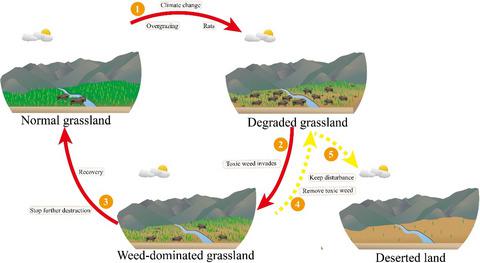当前位置:
X-MOL 学术
›
Ecol. Evol.
›
论文详情
Our official English website, www.x-mol.net, welcomes your feedback! (Note: you will need to create a separate account there.)
Don't judge toxic weeds on whether they are native but on their ecological effects.
Ecology and Evolution ( IF 2.6 ) Pub Date : 2020-07-29 , DOI: 10.1002/ece3.6609 Zhenchao Zhang 1, 2 , Jian Sun 1, 3 , Miao Liu 1 , Ming Xu 1, 4 , Yi Wang 1 , Gao-Lin Wu 2 , Huakun Zhou 3 , Chongchong Ye 1 , Dorji Tsechoe 5 , Tianxing Wei 6
Ecology and Evolution ( IF 2.6 ) Pub Date : 2020-07-29 , DOI: 10.1002/ece3.6609 Zhenchao Zhang 1, 2 , Jian Sun 1, 3 , Miao Liu 1 , Ming Xu 1, 4 , Yi Wang 1 , Gao-Lin Wu 2 , Huakun Zhou 3 , Chongchong Ye 1 , Dorji Tsechoe 5 , Tianxing Wei 6
Affiliation

|
The sharp rise in anthropogenic activities and climate change has caused the extensive degradation of grasslands worldwide, jeopardizing ecosystem function, and threatening human well‐being. Toxic weeds have been constantly spreading in recent decades; indeed, their occurrence is considered to provide an early sign of land degeneration. Policymakers and scientific researchers often focus on the negative effects of toxic weeds, such as how they inhibit forage growth, kill livestock, and cause economic losses. However, toxic weeds can have several potentially positive ecological impacts on grasslands, such as promoting soil and water conservation, improving nutrient cycling and biodiversity conservation, and protecting pastures from excessive damage by livestock. We reviewed the literature to detail the adaptive mechanisms underlying toxic weeds and to provide new insight into their roles in degraded grassland ecosystems. The findings highlight that the establishment of toxic weeds may provide a self‐protective strategy of degenerated pastures that do not require special interventions. Consequently, policymakers, managers, and other personnel responsible for managing grasslands need to take appropriate actions to assess the long‐term trade‐offs between the development of animal husbandry and the maintenance of ecological services provided by grasslands.
中文翻译:

不要根据有毒杂草是否是原生的来判断有毒杂草,而是根据其生态影响来判断。
人类活动急剧增加和气候变化导致全球草地大面积退化,损害生态系统功能,威胁人类福祉。近几十年来,有毒杂草不断蔓延;事实上,它们的出现被认为是土地退化的早期迹象。政策制定者和科学研究人员经常关注有毒杂草的负面影响,例如它们如何抑制饲料生长、杀死牲畜并造成经济损失。然而,有毒杂草可能对草原产生一些潜在的积极生态影响,例如促进水土保持、改善养分循环和生物多样性保护以及保护牧场免受牲畜过度破坏。我们回顾了文献,详细介绍了有毒杂草的适应机制,并为它们在退化草原生态系统中的作用提供了新的见解。研究结果强调,有毒杂草的种植可能为退化牧场提供一种自我保护策略,不需要特殊干预。因此,政策制定者、管理者和其他负责管理草原的人员需要采取适当的行动来评估畜牧业的发展和草原提供的生态服务的维护之间的长期权衡。
更新日期:2020-09-14
中文翻译:

不要根据有毒杂草是否是原生的来判断有毒杂草,而是根据其生态影响来判断。
人类活动急剧增加和气候变化导致全球草地大面积退化,损害生态系统功能,威胁人类福祉。近几十年来,有毒杂草不断蔓延;事实上,它们的出现被认为是土地退化的早期迹象。政策制定者和科学研究人员经常关注有毒杂草的负面影响,例如它们如何抑制饲料生长、杀死牲畜并造成经济损失。然而,有毒杂草可能对草原产生一些潜在的积极生态影响,例如促进水土保持、改善养分循环和生物多样性保护以及保护牧场免受牲畜过度破坏。我们回顾了文献,详细介绍了有毒杂草的适应机制,并为它们在退化草原生态系统中的作用提供了新的见解。研究结果强调,有毒杂草的种植可能为退化牧场提供一种自我保护策略,不需要特殊干预。因此,政策制定者、管理者和其他负责管理草原的人员需要采取适当的行动来评估畜牧业的发展和草原提供的生态服务的维护之间的长期权衡。


























 京公网安备 11010802027423号
京公网安备 11010802027423号